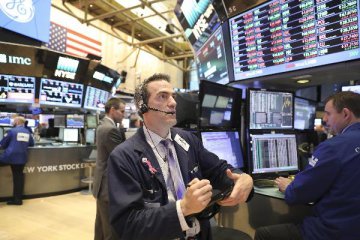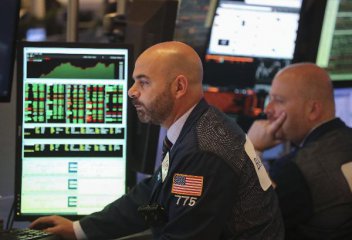U.S. stocks rallied on Monday, as geopolitical tensions eased.
The Dow Jones Industrial Average rose 135.39 points, or 0.62 percent, to 21,993.71. The S&P 500 gained 24.52 points, or 1.00 percent, to 2,465.84. The Nasdaq Composite Index was up 83.68 points, or 1.34 percent, to 6,340.23.
U.S. equities gave up more than one percent last week as tension between the United States and the Democratic People's Republic of Korea (DPRK) escalated.
U.S. President Donald Trump earlier issued a warning to the DPRK that appeared to threaten a nuclear war with the Asian country. In response, the DPRK warned of preemptive strikes against the U.S. military base of Guam in the Pacific.
Analysts said the market rebounded Monday from last week's pullback amid reduced fears of military conflict.
The war fears subsided over the weekend as U.S. military leaders said they are preparing a response to an attack, but prefer diplomacy, said Chris Low, chief economist at FTN, on Monday.
Some traders also said the Monday's market moves appeared to reflect the tendency of investors to buy stocks following the retreat.
The CBOE Volatility Index, widely considered the best gauge of fear in the market, plunged 20.50 percent to 12.33 on Monday.
Meanwhile, there is no major U.S. economic data due on Monday.
Overseas, Japan's economy grew at an annualized rate of 4.0 percent in the April-June quarter, stronger-than-expected, the Cabinet Office said on Monday.
The Dow Jones Industrial Average rose 135.39 points, or 0.62 percent, to 21,993.71. The S&P 500 gained 24.52 points, or 1.00 percent, to 2,465.84. The Nasdaq Composite Index was up 83.68 points, or 1.34 percent, to 6,340.23.
U.S. equities gave up more than one percent last week as tension between the United States and the Democratic People's Republic of Korea (DPRK) escalated.
U.S. President Donald Trump earlier issued a warning to the DPRK that appeared to threaten a nuclear war with the Asian country. In response, the DPRK warned of preemptive strikes against the U.S. military base of Guam in the Pacific.
Analysts said the market rebounded Monday from last week's pullback amid reduced fears of military conflict.
The war fears subsided over the weekend as U.S. military leaders said they are preparing a response to an attack, but prefer diplomacy, said Chris Low, chief economist at FTN, on Monday.
Some traders also said the Monday's market moves appeared to reflect the tendency of investors to buy stocks following the retreat.
The CBOE Volatility Index, widely considered the best gauge of fear in the market, plunged 20.50 percent to 12.33 on Monday.
Meanwhile, there is no major U.S. economic data due on Monday.
Overseas, Japan's economy grew at an annualized rate of 4.0 percent in the April-June quarter, stronger-than-expected, the Cabinet Office said on Monday.





















Latest comments